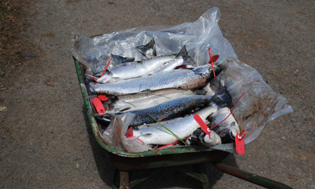 A porpoise caught in an illegal salmon net would have died a “slow, painful” death, police have said.
A porpoise caught in an illegal salmon net would have died a “slow, painful” death, police have said.
Officers are hunting a poacher who set a 125 metre-long nylon net off the west coast of Lewis in the Western Isles.
A porpoise became entangled in the net and died. A dead salmon was also found
< p>Wildlife crime officer Adrian Kay, who is based in nearby Benbecula, said: “It is clear that this porpoise, an intelligent animal, would have suffered a slow, painful death caught in this net.
< p>“The poachers who set this net do not appear to have checked it regularly, allowing this salmon and porpoise to die trapped within it.
< p>“The net was attached to a number of floats, one of which was white and was marked ‘L1 LADY’. We urge anyone with any information about this crime to get in touch.”
< p>The porpoise and salmon were discovered after a member of the public reported the net.
< p>David Maclennan, Western Isles manager for Scottish Natural Heritage, said: “This latest incident highlights the need for people to be vigilant about the use of illegal salmon nets in the area and to report cases to the authorities.
< p>“As well as being illegal, this form of salmon netting poses a major threat to porpoises, dolphins, and basking sharks which often feed in the main netting areas. We are committed to working with fishery boards and the police to stamp out the practice.”
Police Scotland said they are working with conservation agencies and fishery groups in the area to find the culprit.
Wildlife crime officer Adrian Kay, who is based in nearby Benbecula, said: “It is clear that this porpoise, an intelligent animal, would have suffered a slow, painful death caught in this net.
“The poachers who set this net do not appear to have checked it regularly, allowing this salmon and porpoise to die trapped within it.
Read More:
The Herald (31 Jul 2013)
The Scotsman (1 Aug 3013)
ASFB Comment:
This report highlights the significant problem of illegal gill netting for salmon and the wider damage to cetaceans and indeed sea birds that can occur. The extent of this serious wildlife crime is demonstrated by the fact that in 2012 water bailiffs employed by Scotland’s District Salmon Fishery Boards seized 129 illegal gill nets.
It is illegal to sell rod caught salmon and sea trout in Scotland and therefore the only fish that can legally reach the market are those caught in legally operated commercial nets. However, in Scotland, as opposed to the rest of the UK and the Republic of Ireland, we do not currently require such legally caught fish to be tagged, thereby allowing consumers to identify them as being legally taken. Until this situation is remedied, it is nearly impossible to prevent illegally taken fish reaching the market. The Aquaculture and Fisheries (Scotland) Act 2013 now gives Scottish Ministers the powers to introduce such a system in Scotland. However, unless such a system uses individually numbered and recorded tags, the wider impacts of illegal and indiscriminate netting will not be reduced.
It is also worth noting that retailers of such nets in Scotland also bear some responsibility for this situation. We have reported at least one retailer to Wildlife Crime Officers who specifically markets such nets for the capture of salmon.
